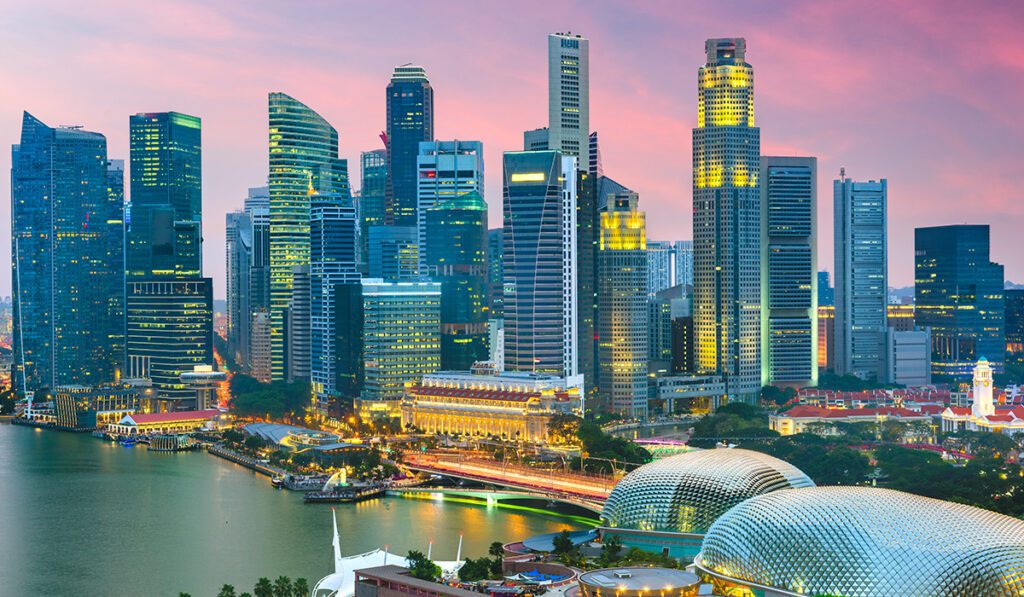

In the global business landscape, selecting the right location is pivotal. Singapore and the United Kingdom stand out as enticing hubs for international ventures, boasting robust economies and strategic locations. This article provides a focused analysis, offering strategic insights for decision-makers navigating the distinctive business environments of doing business in Singapore vs United Kingdom. From regulations to cultural nuances, we explore the key factors shaping success in Singapore and the UK.
Economic Overview for doing business in Singapore vs United Kingdom
Singapore’s Accounting and Corporate Regulatory Authority (ACRA) simplifies business establishment, offering foreign investors tax benefits, streamlined incorporation, and various incentives. The country actively encourages foreign trade and investment. The Ministry of Trade and Industry (MTI) projects Singapore’s GDP to grow up to 3% in 2024.
Meanwhile, the United Kingdom anticipates just 0.5% GDP growth in 2024. With a well-established and independent economy, international trade accounts for 55.5% of the UK’s GDP. The Department for International Trade oversees foreign investment in the country.
Business Environment
Singapore boasts a fast-paced, highly globalized economy, hosting over 37,000 foreign companies. Renowned for innovation and technological advancements, it provides an attractive business environment across various industries.
In contrast, the United Kingdom operates as a market-oriented economy with a focus on developing its social market. Recognized for its business-friendly environment and robust economy, the UK is a sought-after destination for business expansion, investments, and trade.
Financial and Tech Hub
Singapore ranks second globally for ease of doing business, boasting a highly developed, corruption-free, and open economy with a GDP surpassing that of many developed nations. The country’s stable political environment supports a pro-business policy direction, emphasizing liberalization and attracting investments in pharmaceuticals and high-tech industries.
Meanwhile, the United Kingdom, Europe’s second-largest economy, holds the eighth spot in the World Bank’s Global Survey. Known for its intensive and efficient agriculture, the UK serves about 60% of its food needs with less than 2% of the labor force.
Workforce
Singapore boasts a predominantly young workforce, with a majority under 35, while the United Kingdom has a median population age of 40.5. Singapore’s workforce is predominantly white-collar, with a focus on professional jobs. In contrast, the UK has a diverse workforce, with professional workers constituting only 25.7%. Additionally, the UK faces a shortage of blue-collar workers as younger individuals pursue managerial roles.
Business Language
Singapore and the United Kingdom excel in English proficiency. In Singapore, a multicultural nation, the population is diverse, with significant numbers conversant in Singaporean Mandarin, Malay, Tamil, or a mix of these languages. Similarly, in the United Kingdom, English predominates, but regional variations include Scots and Welsh, depending on the area.
Doing Business in Singapore vs United Kingdom: Incorporation and Setup Process
To set up a private limited company in Singapore, you need 1 shareholder, 1 local resident director, 1 local company secretary, a minimum paid-up capital of S$1, and a local registered address. Foreign individuals are permitted to incorporate and own 100% of the company without relocating to Singapore.
On the other hand, incorporating a company in the UK involves selecting a business structure, choosing a unique name, providing a registered office address, appointing directors and shareholders, drafting memorandum and articles of association, registering with Companies House, receiving a Certificate of Incorporation, registering for taxes, opening a business bank account, and maintaining ongoing compliance with legal and regulatory requirements, such as filing annual accounts and returns with Companies House and meeting tax obligations.
Filing Requirements
In Singapore, all requirements are accessible through BizFile+, and the necessary documents vary based on the business type, while the UK government outlines the incorporation process and requirements on its website for businesses in the United Kingdom.
Immigration Requirements
Singapore provides various visas, including the EntrePass for foreign entrepreneurs and the Employment Pass for managers and workers. Similarly, the UK offers a range of visas, such as the Senior or Specialist Worker Visa, Health and Care Worker Visa, and Long-term Work Visas, catering to diverse immigration needs.
Ideal Taxation System
A jurisdiction with favorable tax conditions, attracting entities and individuals aiming to minimize tax liabilities through low or zero taxes, stringent financial privacy laws, and minimal reporting requirements, would truly be a tax haven. Understanding these nuances is essential for those navigating international taxation. The following are some of the noteworthy examples.
Income Tax
Singapore boasts the world’s lowest effective tax rates, with a progressive tax rate reaching up to 22%. In contrast, the United Kingdom levies income tax rates as high as 45% for higher brackets of taxable income.
Corporate Tax
Singaporean companies benefit from a 17% headline corporate tax rate, and from 2020 onwards, newly incorporated firms enjoy 75% tax exemption on their initial S$100,000 chargeable income for the first 3 years, while in the UK, companies face 25% corporate tax rate and may claim research and development, tax reliefs for innovative projects.
Withholding Tax
Singapore’s withholding tax varies from 22% to 24%, while UK resident company payments to non-resident companies incur a 20% withholding tax, with no obligation to deduct withholding taxes from dividends.
Foreign-Sourced Income
While resident companies in the UK are taxed on foreign income, Singapore does not tax profits earned and retained outside the country for resident companies, in contrast to non-resident companies.

Government Grants in Singapore
In Singapore, government grants drive innovation, sustainability, and business advancement across diverse sectors, shaping success stories nationwide via the following grants.
1. Startup SG Equity
The government collaborates with independent, qualified third-party investors to co-invest in eligible innovative startups. The primary criteria include that the company must be registered and based in Singapore. The company’s core activities should be conducted in Singapore.
2. Startup SG Tech
Facilitates concepts to drive the commercialization of cutting-edge technologies. Requires Singapore-based companies working on innovative technologies with commercial potential. Projects must address market needs or create new opportunities, demonstrating significant potential for economic impact and job creation in Singapore.
3. Startup SG Founder
First-time entrepreneurs with innovative business ideas can access mentorship and a startup capital grant of S$30,000. Applicants must be Singaporean citizens or permanent residents and first-time entrepreneurs. while the applicant must hold at least 30% equity.
4. Startup SG Accelerator
Assists incubators and accelerators in key growth sectors, offering nurturing programs, mentorship services, and partial funding for operating expenses. Primarily requires Singapore-based incubators and accelerators focusing on key sectors like technology, healthcare, or advanced manufacturing.
5. Startup SG Talent
Promoting the establishment of innovative businesses in Singapore by attracting global talent, which encompasses initiatives like EntrePass, T-Up, and the SME Talent Program (STP) tailored for startups. Startups receive 70% subsidized stipends and HR support, including recruitment and talent management assistance. They gain access to the SME Talent Programme (STP) for local talent acquisition, contingent upon maintaining a minimum 30% local shareholding.
Trade and Investments
Singapore, without natural resources, embraces global trade and investment. It champions economic integration through agreements like ASEAN and TPP. Over 99% of goods enter duty-free, maintaining openness amid global shifts. Both Singapore and the UK boast efficient public transport, with London offering cars at 70% lower prices. However, Singapore surpasses the UK in the number of government assistance programs.
Robust IP Protection
Since 2003, Singapore has prioritized safeguarding intellectual property rights, granting creators control. The UK also places a high emphasis on the efficient protection of intellectual property for citizens and businesses.
A Snapshot Comparison | Doing business in Singapore vs. United Kingdom
Find all the key insights you need at a glance.
| Aspect | Singapore | United Kingdom |
| Business Environment (DB Score) | 86.2 (ranked 2nd globally) | 83.5 (ranked 8th globally) |
| Economic Overview | Favors foreign trade, tax benefits, streamlined incorporation | Independent and developed, 55.5% of GDP from international trade |
| Corporate Landscape | Dynamic, globalized, innovation hub | Market-oriented, business-friendly, robust economy |
| Workforce Composition | Young, predominantly white-collar | Median age 40.5, diverse workforce mix |
| Language Proficiency | English proficiency, multicultural | Proficient in English, regional languages like Scots and Welsh |
| Incorporation Process | ACRA, streamlined BizFile+ registration | Digital or paper-based, Form IN01, with various requirements |
| Filing Procedures | Detailed requirements in BizFile+, varying per business type | The UK government website outlines incorporation steps and prerequisites |
| Visa and Immigration | Multiple visa types (EntrePass, Employment Pass) | Various visas (Senior or Specialist Worker, Health and Care Worker, Long-term Work) |
| Taxation Structure | Competitive flat tax rate of 17% | Corporate tax rate is 25% |
| Intellectual Property Protection | Emphasis on IP protection since 2003. | Strong IP protection, efficient safeguards for rights. |
| Bureaucratic Efficiency | Highly efficient, functional bureaucracy. | Operates with His Majesty’s Civil Service. |
| Openness to Trade | Business-friendly, open to foreign trade and investment. | Limited openness post-Brexit, impacting productivity and competitiveness. |
| Global Competitiveness | Ranked 1st globally for competitiveness. | Global competitiveness declined post-Brexit, ranking 9th globally. |
| Geographical Location | Strategic location in SEA and Asia. | Former EU trading hub, decline in foreign trade post-Brexit. |
How We Can Help: Our Company Secretary Service
Explore seamless company formation with Premia TNC, whether you are an overseas company entering Singapore or a foreign individual looking to incorporate. Our all-encompassing services streamline the complex process, guiding you through incorporation and aiding in key decisions like deciding on a Financial Year End. Trust our expertise for the hassle-free and successful establishment of your business in Singapore.
FAQs
1. How do corporate tax rates in Singapore compare to those in the United Kingdom?
Singapore's flat 17% corporate tax rate is lower than the UK's 25%, providing businesses with more retained profits for growth, making Singapore a preferred global business hub.
2. How does the ease of doing business in Singapore differ from that in the United Kingdom?
Singapore's streamlined processes, minimal bureaucracy, and strategic location in Asia make it an ideal environment for entrepreneurs, outperforming the UK in global ease of doing business indices.






















